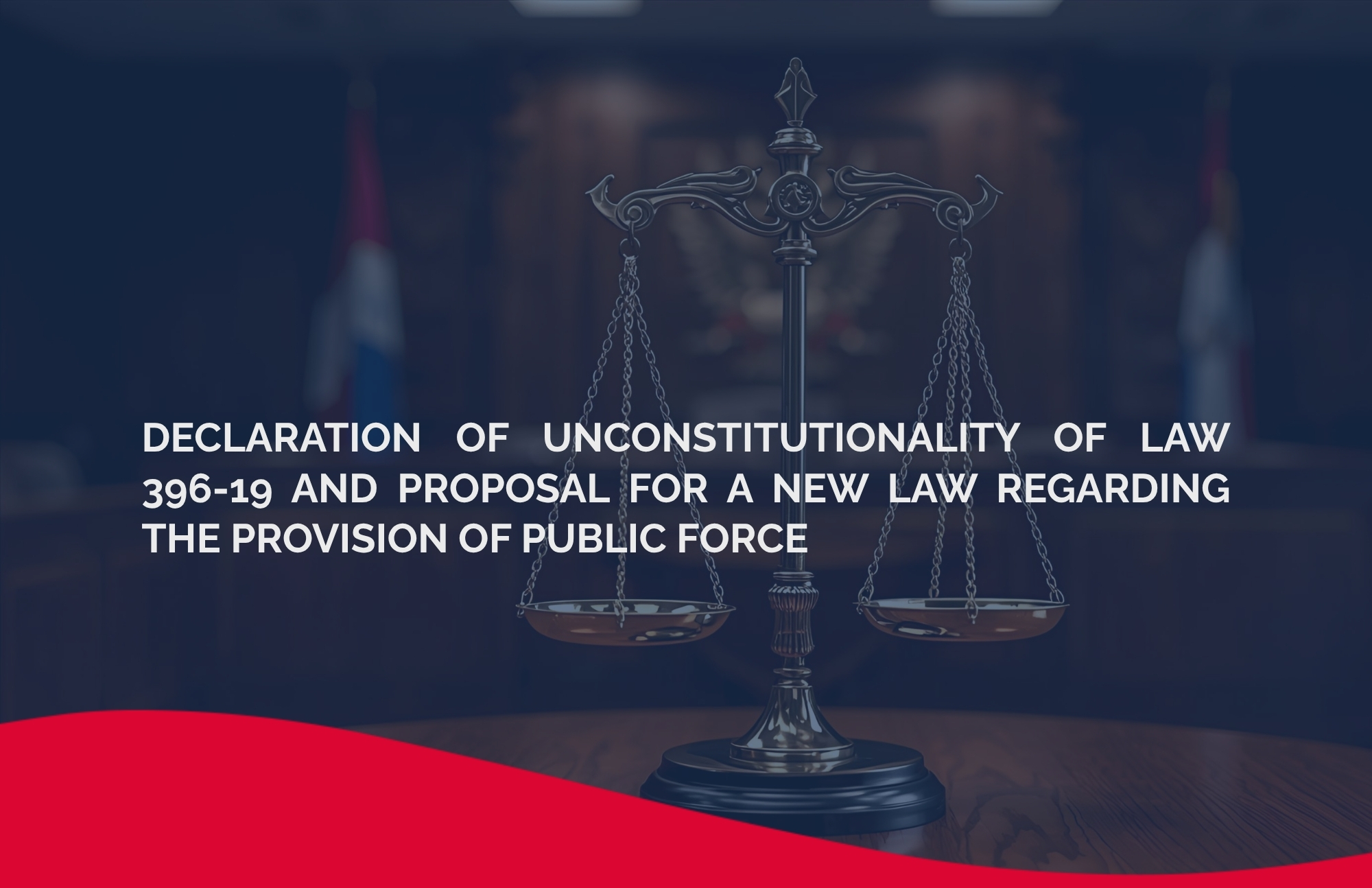
Declaration of Unconstitutionality of Law 396-19 and Proposal for a New Law Regarding the Provision of Public Force
The Constitutional Court (CC) declared Law No. 396-19 unconstitutional, which regulated the granting of public force to execute conservatory measures and judgments concerning movable and immovable property. The decision, contained in ruling CC/0743/25, is based on a direct action of unconstitutionality filed by Genaro A. Silvestre Scroggins, Franklin José Zabala Jiménez, and the National Association of United Bailiffs (ANAU), determining that the law was enacted in violation of constitutional procedures and fundamental principles of the Dominican legal order.
Grounds for the Constitutional Decision
The Court concluded that Law 396-19 was processed as an ordinary law, even though, by its content and subject matter, it should have been approved as an organic law, in accordance with Article 112 of the Constitution and the precedent established in ruling CC/0110/13. This formal defect was decisive for declaring its unconstitutionality.
The ruling also reaffirmed that the power to execute judgments belongs exclusively to the Judiciary, pursuant to Article 149, paragraph I of the Constitution, and not to the Public Prosecutor’s Office. In this regard, the Court found it unconstitutional to assign to the Public Prosecutor’s Office the authority to authorize, direct, or suspend the use of public force in the execution of judgments or conservatory measures.
The CC specified that the control and granting of public force are part of the judicial function, and therefore must be exercised solely by competent judges or courts. The participation of the Public Prosecutor’s Office, the ruling noted, must be limited to prosecuting criminal acts that may occur during enforcement procedures, without the power to authorize or direct the use of force.
Effects and Exhortation to the National Congress
In its decision, the Constitutional Court urged the National Congress to enact a new law that corrects the identified formal unconstitutionality and aligns the regulation with constitutional parameters. To allow this legislative adjustment, the CC postponed the effects of the declaration of unconstitutionality for two years from the date of notification of the ruling.
Draft of a New Organic Law on the Granting of Public Force
In compliance with ruling CC/0743/25, a draft “Organic Law Regulating the Granting of Public Force to Carry Out Conservatory and Executory Measures” was submitted to the Senate of the Republic by Senator Cristóbal Venerado Castillo (PRM-Hato Mayor) on September 15.
This legislative initiative seeks to correct the defects identified by the Constitutional Court, ensuring that the new regulation is processed as an organic law and that the power to enforce judicial decisions rests exclusively with the Judiciary. The bill removes all references to the Public Prosecutor’s Office as the authority responsible for granting public force, replacing it with competent courts.
Essential Content of the Legislative Proposal
The bill establishes that the court that issued the decision shall be the body authorized to grant the use of public force for the execution of judgments, enforceable titles, or conservatory measures, upon request by the interested parties. The regulation applies to the execution of measures involving movable and immovable property, as well as seizures, evictions, and other actions requiring public force assistance.
The draft law complies with Article 112 of the Constitution and the precedent set by ruling CC/0110/13, reaffirming that the exercise of judicial authority belongs solely to the Judiciary. It also eliminates the “prohibition of ex officio conciliation” clause contained in Law 396-19, which had prevented members of the Public Prosecutor’s Office from promoting conciliations or mediations in cases involving requests for public force assistance.
Conclusion
The declaration of unconstitutionality of Law 396-19 and the subsequent submission of the draft organic law represent a significant step toward strengthening the separation of powers and reinforcing the Judiciary’s authority. This legal evolution seeks to ensure compliance with the constitutional principle that the enforcement of judgments is a judicial function, and that the use of public force in such processes must remain under the courts’ control, in full adherence to the Dominican constitutional order.